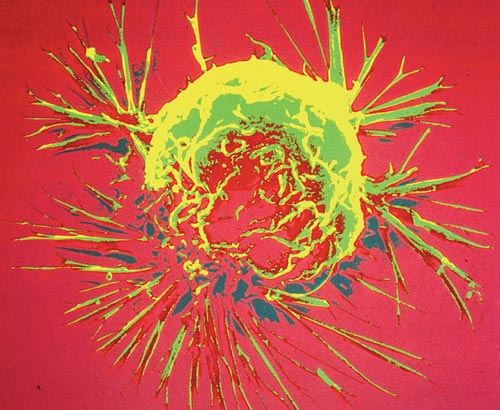The results of studies by a team of scientists in the U.K. and Spain suggest that the commonly used antipsychotic drug Pimozide could offer a new treatment approach to the most hard to treat form of breast cancer, and potentially for lung cancer. The research, headed by Mohamed El-Tanani, Ph.D., professor of molecular pathology and cancer therapeutics at the University of Bradford, found that Pimozide significantly reduced the size and number of human triple-negative breast cancer tumors in mice, and almost completely stopped the tumors from metastasizing to the lung.
Although previous studies have hinted that antipsychotic drugs may have some anticancer properties, the latest research, published in Oncotarget, is the first to suggest mechanisms by which the antipsychotic drug inhibits cancer. “Triple-negative breast cancer has lower survival rates and increased risk of recurrence,” comments Dr. El-Tanani. It is the only type of breast cancer for which only limited targeted treatments are available. Our research has shown that Pimozide could potentially fill this gap. And because this drug is already in clinical use, it could move quickly into clinical trials.”
The University of Bradford researchers, and colleagues at Queen’s University Belfast, and the University of Salamanca in Spain, report their findings in a paper titled, “The antipsychotic drug Pimozide is a novel chemotherapeutic for breast cancer.”
Antipsychotic drugs represent first-line treatment for disorders such as schizophrenia, and primarily target neurotransmitter receptors. Pimozide, for example, is an antipsychotic in the diphenylbutylpiperidine class, which selectively blocks the dopamine receptor D2 (DRD2) and is used to treat a range of mental/mood disorders, including chronic schizophrenia, as well as other psychotic disorders, the researchers write.
Interestingly, it has long been suggested that patients with schizophrenia have a lower incidence of cancer than is found in the general population, and a number of epidemiological studies have investigated this putative link. “Likewise, clinical data indicates that the use of medication for schizophrenia lowers the relative risk of cancer,” the authors write. And while “cancer risk in schizophrenic patients remains a controversial issue,” they continue, “antipsychotic drugs have been suggested as possible mediators of this effect.”
Prior work by Dr. El-Tanani’s team had shown that the protein Ran-GTPase (Ran) plays a role in enabling the growth and spread of cancers, including triple-negative breast cancer. They carried out a connectivity mapping analysis to search for small molecule compounds that could potentially suppress Ran, and identified Pimozide as the top candidate. Previous research had already shown that Pimozide can inhibit proliferation of a human breast cancer-derived cell line, and the drug had “gained attention as an anticancer agent,” the team notes.
Subsequent tests in an invasive human breast cancer cell line MDA-MB-231 and lung cancer cell line showed that Pimozide significantly inhibited cancer cell survival, resulting in significant DNA damage and promoting apoptosis. Pimozide administration also blocked Ran expression—at the mRNA and protein level—by up to 87%, inhibited AKT1 expression almost completely, and blocked AKT2 expression by up to 72%. The AKT signaling pathway plays a key role in tumor development and angiogenesis.
Pimozide also inhibited the migratory capacity of two different breast cancer cell lines, with analyses indicating that the drug reduced the expression of MMP1 and MMP14 RNA. Further studies confirmed that Pimozide led to reductions in multiple markers of cell motility, and also blocked expression of the epithelial to mesenchymal transition (EMT) markers Vimentin and Zo-1. “… Pimozide significantly inhibited MDA-MB-231 cell growth, migration, invasion, and tumorigenicity in vivo and these effects were associated with suppression of EMT, a process involving the breakdown of cell-cell junctions and loss of epithelial polarity,” the researchers write.
Encouragingly, Pimozide also inhibited the growth, proliferation, and metastasis of human breast cancer xenografts in mice. Tumor volume was reduced by up to 65%, and there were 94% fewer metastases. Immunohistochemical analyses confirmed a complete absence of AKT in tumors, while tumors from the Pimozide-treated mice also showed “a significant decrease in staining for Vimentin,” the authors state.
Further studies in the tumor-bearing mice and in breast cancer cell lines confirmed the anti-angiogenic effects of Pimozide treatment. The drug suppressed VEGFR2 production, and also prevented the differentiation of myofibroblasts that play a role in cancer metastasis, by blocking the production of αSMA in the mouse tumors. “This protein was completely depleted in breast tumors in mice treated with Pimozide compared to those in untreated mice, and the treated mice also had fewer lung metastases,” the researchers state. “Promoter analysis of the VEGFR-2 gene showed a clear dose- and time-dependent inhibitory response to Pimozide, indicating that this and other neuroleptic agents could exert antitumor effects through disrupting the vasculature in addition to promoting apoptosis in the tumor cells themselves.”
Interestingly the team found a strong correlation between mRNA levels of Ran and VEGFR2 in human breast cancer databases.
“Collectively this study provides strong evidence for multiple molecular mechanisms through which Pimozide exerts anti-tumor activity in breast cancer cells and therefore could be a useful agent for treatment in the future,” the authors conclude.
“This study is the first to report that an FDA-approved neuroleptic drug, Pimozide, which is already in clinical use, has multiple anticancer effects, since it inhibits cell proliferation, and has an anti-angiogenic and anti-metastatic activity … It was also demonstrated for the first time in this study that Pimozide acts as a potent anti-angiogenic modulator through the inhibition of the AKT and VEGF signaling pathways.”
“There are many molecular pathways that are hyperactive in cancer,” comments Dr. El-Tanani. “Our study shows that by acting as a RanGTP inhibitor, Pimozide was able to block a number of key pathways that contribute to triple negative breast cancer growing and spreading.”
The team is now looking for funding to move the Pimozide into clinical trials for treating cancer.



